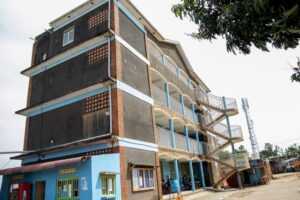
Average Reviews
Description
Kiwoko Health Training Institute.
The Kiwoko Health Training Institute stands as a beacon of excellence in Uganda’s healthcare education landscape. Since its inception, this institution has dedicated itself to molding skilled professionals who bridge critical gaps in medical services across the country. Specializing in Medical Laboratory Techniques, Nursing, and Midwifery, the institute combines rigorous academic training with hands-on experience, ensuring graduates are not just qualified but confidently ready to serve communities in need. Let’s delve into what makes this school a cornerstone of Uganda’s healthcare future.A Legacy of Empowerment: The Birth of Kiwoko’s Nursing and Midwifery Program
The institute’s Nursing and Midwifery School traces its roots to 1992, when Sue Hooking, a visionary educator, began training young women from nearby communities who had completed Senior Four. What started as a grassroots initiative soon caught the attention of Uganda’s Ministry of Health. Impressed by the students’ performance, the ministry upgraded the program in 1994, transforming trainees from Nursing Aides to Enrolled Nurses—a milestone that signaled the school’s growing credibility. By 1999, the program earned official registration under Uganda’s Ministry of Health and the Uganda Nurses and Midwives Council, cementing its role as a trusted institution.Today, the school offers two flagship courses:- Certificate in Nursing: A comprehensive program blending theoretical knowledge with clinical practice, preparing students to handle diverse medical scenarios.
- Certificate in Midwifery: Focused on maternal and neonatal care, this course equips trainees to reduce maternal mortality rates—a critical need in Uganda, where access to skilled birth attendants remains limited.
Pioneering Laboratory Training: From Humble Beginnings to National Impact
In 1991, Kellen Morgan laid the foundation for Kiwoko’s Medical Laboratory Training School with just four students. Classes were initially held in unused hospital spaces—a testament to the institute’s resourcefulness. The turning point came in 2005 when AMREF Health Africa, a key player in African healthcare development, funded the construction of dedicated classrooms and a skills laboratory. This upgrade not only expanded capacity but also attracted students nationwide, transforming the school into a hub for aspiring lab technicians.The curriculum emphasizes practical proficiency, addressing a gap identified in many African laboratory programs where theoretical knowledge often overshadows hands-on skills. Students master techniques like bacteriology and parasitology culturing—skills critical for diagnosing diseases such as cholera and malaria, which disproportionately affect Uganda’s population Graduates emerge ready to work in hospitals, research facilities, or public health agencies, bolstering Uganda’s diagnostic infrastructure.Why Kiwoko Stands Out: Key Strengths and Innovations
- Strategic Partnerships: Collaborations with organizations like AMREF and Uganda’s Ministry of Health ensure the institute stays aligned with national healthcare goals. These partnerships also provide access to funding, modern equipment, and expert mentorship.
- Community-Driven Admissions: By recruiting students from rural areas, Kiwoko addresses geographic disparities in healthcare access. Graduates often return to their hometowns, creating a sustainable cycle of skill redistribution.
- Focus on Women’s Health: The midwifery program directly tackles Uganda’s high maternal mortality rates, training professionals to manage complications like hemorrhage and obstructed labor—a mission echoed by AMREF’s continent-wide initiatives.
- Adaptability: From repurposing hospital spaces in the 1990s to integrating e-learning tools today, Kiwoko evolves with Uganda’s educational and technological advancements.
Alumni Impact: Stories of Transformation
The institute’s graduates are its strongest endorsement. Take Aneno Irene Oriech, a lab technician (not affiliated with Kiwoko but emblematic of its mission), whose training at a similar institution enabled her to combat cholera outbreaks through advanced diagnostic skills. Kiwoko’s alumni likely follow comparable paths, serving in facilities like Uganda’s Directorate of Government Analytical Laboratory or rural clinics where their expertise saves lives daily.Challenges and Future Directions
While Kiwoko excels, it faces hurdles common to Ugandan educational institutions:- Funding Gaps: Reliance on external donors like AMREF poses sustainability risks. Diversifying revenue through government grants or alumni contributions could foster long-term stability.
- Equipment Shortages: Advanced lab tools remain scarce in many African schools. Partnerships with global health organizations could help bridge this gap.
- Scalability: Expanding enrollment without compromising quality requires careful planning, possibly through satellite campuses or hybrid learning models.
Conclusion: A Model for African Healthcare Education
The Kiwoko Health Training Institute is more than a school—it’s a lifeline for Uganda’s healthcare system. By blending tradition with innovation, it produces graduates who are not just skilled but deeply committed to their communities. For businesses and institutions seeking to partner with or support Ugandan education, Kiwoko represents a proven investment in human capital. As the institute continues to grow, its story serves as a powerful reminder: when you train a healthcare worker, you heal a nation.Explore Kiwoko Health Training Institute- Location: Integrated within Kiwoko Hospital, Central Uganda
- Courses Offered: Certificate in Nursing, Midwifery, Medical Laboratory Techniques
- Admissions: Open to Ugandan nationals, with emphasis on rural applicants
- Partnership Opportunities: Collaborate with AMREF or Uganda’s Ministry of Health to support scholarships or infrastructure projects.



